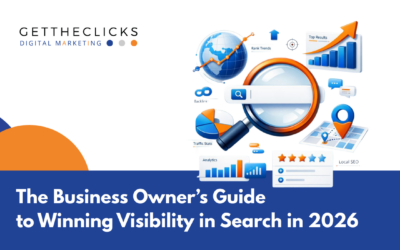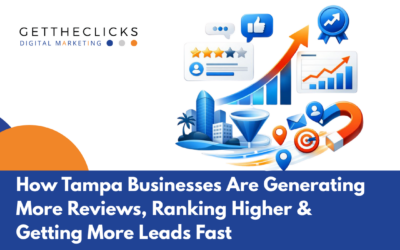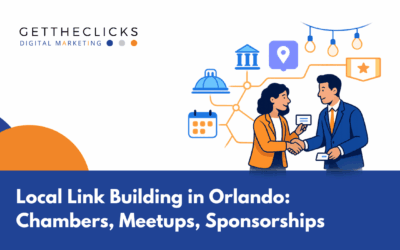SEO is a complex field with ever-changing trends, algorithms, and practices. And to add to the confusion, there are many widespread myths about the industry. If you fall for these unfounded myths, it can significantly impact your understanding of SEO and cause you to create SEO strategies that yield poor results. Let’s look at 10 prevalent myths our Orlando SEO agency has come across and debunk them:
Myth 1: SEO Is Only About Keywords

While there’s no doubt that keywords are an essential part of SEO, they are not the only factor that determines a website’s ranking on search engines.
Search engines like Google use complex algorithms that take into account various factors to determine a website’s relevance and authority. These factors include the website’s content, backlinks, user experience, page load speed, and more.
Focusing solely on keywords can actually harm a website’s SEO efforts if you end up keyword stuffing, or excessively using keywords in content or meta tags, resulting in your website being penalized by search engines.
Instead of focusing on keywords alone, website owners should focus on creating high-quality, informative content that provides value to users. This content should be optimized with relevant keywords, but not at the expense of the user experience.
In addition to content, website owners should also focus on building a strong backlink profile. Backlinks from reputable websites can signal to search engines that a website is authoritative and trustworthy.
Myth 2: More Links Equal Better Ranking
One of the most common SEO myths is that more links automatically mean better rankings. While it’s true that links are an important ranking factor, the quantity of links is not the only thing that matters. Quality always triumphs over quantity!
Search engines like Google value the quality of links over the quantity of links. A single high-quality link from a reputable website can be more valuable than dozens of low-quality links from spammy websites. When building links, it’s crucial to focus on quality over quantity. Look for opportunities to get links from websites that are relevant to your niche and have a good reputation. These links will carry more weight and help improve your rankings.
In addition to quality, relevance also matters when it comes to link building. Links from websites that are closely related to your niche or topic are more valuable than links from unrelated websites. As an example, imagine that you operate a website specializing in pet products. In this case, a link from a prominent pet blog holds greater value than a link from an unrelated blog focused on gardening. The relevance of the linking website plays a crucial role in influencing your search engine rankings positively.
Myth 3: SEO Is Something You Do Once
Many people believe that once they optimize their website for search engines, they can sit back and watch the traffic roll in. However, this is far from the truth.
SEO is an ongoing process that requires continuous effort and attention. Search engines are constantly updating their algorithms, and what worked yesterday may not work today. Staying current with the latest SEO trends and adhering to best practices is crucial for maintaining your website’s relevance and visibility on search engine results pages.
SEO optimization involves a range of tasks, from keyword research and content creation to link building and technical optimization. Each of these tasks demands distinct skills and expertise, making it challenging for one person to handle them all effectively.
To succeed in the realm of SEO, collaboration with a team of professionals like us is vital. Our expertise will help you develop and execute a comprehensive SEO strategy tailored to your specific business goals, target audience, and industry. Remember, there is no one-size-fits-all solution in SEO. What works for one website may not be effective for another. To achieve long-term success, continuous effort and attention are necessary.
With our experienced SEO team’s guidance and a personalized approach tailored to your specific business objectives, your website will not only retain its relevance and visibility in search engine results but also ensure long-lasting success amidst the ever-evolving digital landscape.
Myth 4: SEO Results Are Instant
This is an important myth to debunk, as many people mistakenly assume that they will see an immediate increase in traffic and rankings.
The fact is, SEO is a long-term strategy that requires patience and consistency. It takes time for search engines to crawl and index your website, and even longer for them to recognize your website as a high-quality source of information. It’s reasonable to expect that it can take weeks or even months to see any significant results from your SEO efforts.
Moreover, the SEO landscape is constantly changing, with search engines updating their algorithms regularly. This means that even if your website is optimized today, it may not be tomorrow. You need to stay up-to-date with the latest SEO trends and best practices to ensure that your website remains favored by search engines.
Don’t fall for the trap of believing that SEO is a quick fix when it’s really a long-term strategy that requires patience, consistency, and ongoing effort. By understanding this, you can set realistic expectations for your SEO efforts and avoid falling for the myth of instant SEO results.
Myth 5: Social Media Has a Direct Impact on SEO

While social media can indirectly affect SEO, it does not have a direct impact on search engine rankings. One of the main reasons people believe that social media affects SEO is because of social signals. Social signals are the likes, shares, and comments that a piece of content receives on social media. While social signals can help increase brand visibility and drive traffic to a website, they don’t directly affect search engine rankings. However, social signals can help by increasing brand visibility and driving traffic to a website. This can lead to more backlinks, which are a direct ranking factor.
While social media can indirectly affect SEO, it’s important to understand that it doesn’t have a direct impact on search engine rankings. Businesses should focus on creating high-quality content and building backlinks to improve their search engine rankings, rather than relying on social media to directly affect their SEO.
Myth 6: SEO Is Dead
The persistence of this myth year after year is quite astounding. Despite the longevity of this myth, though, it couldn’t be farther from the truth. In fact, SEO is now more critical than ever, continually evolving to meet the demands of the digital landscape.
One misconception contributing to the belief in SEO’s demise is the idea that it is no longer effective. On the contrary, SEO remains one of the most potent methods to drive website traffic and enhance online visibility.
Another factor fueling this myth is the perception that SEO is overly complex and challenging to grasp. While SEO can be complex, it’s not impossible to understand. Numerous resources are available to help people learn the fundamentals of SEO, and an array of SEO tools are at their disposal for website optimization. Moreover, there are seasoned SEO experts like us who possess a profound understanding of SEO intricacies and know how to implement powerful strategies to elevate your online presence. Rest assured, SEO is far from dead; rather, it thrives as a crucial aspect of digital success.
Myth 7: Local SEO Doesn’t Matter
Local SEO is essential for any business that wants to be found by potential customers in their area. Even if a business doesn’t have a physical storefront, it can still benefit from local SEO by targeting specific geographic areas and optimizing its website for local search queries.
Local search queries are on the rise and according to Google, “near me” searches have increased by 500% in the past few years. This means that more and more people are searching for businesses in their area, and if a business isn’t optimized for local search, they could be missing out on potential customers.
Additionally, Google My Business is a powerful tool that allows businesses to manage their online presence across Google, including in search results and on Google Maps. By optimizing their Google My Business listing, businesses can improve their visibility in local search results and provide potential customers with important information such as their address, phone number, and hours of operation.
Local SEO is an essential part of any SEO strategy and businesses that ignore it do so at their own peril. By optimizing for local search queries, businesses can improve their visibility in their community, build trust with potential customers, and ultimately drive more traffic and sales to their websites.
Myth 8: SEO Only Matters for Big Companies

Do you believe that SEO is only reserved for large corporations with massive budgets? Think again. In today’s digital landscape, the right SEO strategy can level the playing field, allowing even small businesses to establish a notable online presence and compete with bigger companies.
The misconception that only substantial budgets can overpower competitors in the SEO game may deter some smaller businesses from investing in SEO efforts. However, while it’s undeniable that larger budgets may facilitate more extensive SEO campaigns, even modest investments in SEO can yield remarkable results in online visibility and search rankings. Even on a budget, businesses can implement effective SEO tactics like keyword research, on-page optimization, and content creation – all of which play a vital role in enhancing online presence.
Small businesses should not shy away from SEO simply because they lack the financial resources of larger corporations. With smart planning, strategic implementation, and dedication to quality content, even modest investments in SEO can yield substantial rewards, allowing small businesses to carve a significant online presence and thrive in the digital realm.
Myth 9: LSI Keywords Are Unimportant
One pervasive myth is that Latent Semantic Indexing (LSI) keywords are unimportant in SEO. However, LSI keywords actually do play a vital role in enhancing website visibility, search rankings, and overall content quality.
LSI keywords refer to words or phrases closely associated with a primary keyword, sharing the same semantic meaning. Search engines utilize LSI to grasp the context and significance of a web page’s content. Including LSI keywords in content enables website owners to offer a more comprehensive and contextually relevant experience, facilitating search engines in aligning search queries with relevant content.
Overall, LSI keywords enable search engines to better understand your website and helps to prevent keyword stuffing, where you’re repeating the exact keywords over and over again. With this holistic approach, LSI keywords can enhance the relevance of a page in a safer manner, increasing the chances of it being ranked for a broader range of search queries.
Myth 10: Content Optimization Just Needs to Be Done Once
The issue with this approach is that it implies once you’ve crafted the content, ensuring it adequately addresses searchers’ queries, you can simply move on. However, over time, the way searchers seek content may evolve. Keywords and content preferences could shift.
Search engines themselves might alter what they consider the most relevant response to a query, interpreting the intent behind the keyword differently. Moreover, the layout of search engine results pages (SERPs) could change, with videos now taking precedence at the top instead of just webpage results.
If you only review a page once and fail to continuously update and adapt it to meet user needs, you risk falling behind and losing visibility in search rankings. It’s imperative to continually update your content to remain relevant and cater to the ever-changing demands of searchers and search engine algorithms.
Related Content >> Orlando SEO services
Learn More About SEO With Get The Clicks
It’s vital to debunk myths so that you get a clearer understanding of SEO, which helps you craft effective and successful SEO strategies. Navigating the complicated realm of SEO can often be confusing, and being misled by unfounded myths doesn’t help. What you need is a team of SEO experts with a sound understanding of SEO to help you create effective SEO strategies for your business. Don’t hesitate to call us today and see how we can help your business gain more online visibility, traffic, leads and sales!





